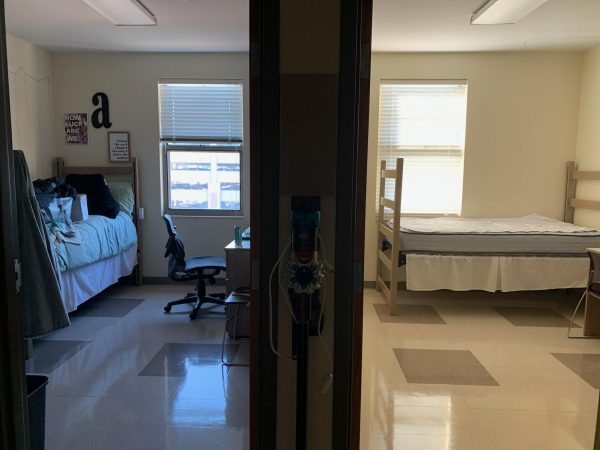ECHO remembers Lawrence George’s contributions to Rolla’s history
In 2011, the ECHO staff interviewed several prominent civil rights advocates who saw Rolla through the movement. The group of leaders came to the high school for the purpose of the interview and students Kim Wronkiewicz and Abby Priesmeyer told their story in an article published in the Feb. 25, 2011 issue of ECHO.
Lawrence George, former assistant to the chancellor for affirmative action and equal employment opportunity at Missouri S&T was one of their sources. George died on March 24.
It was an influential day for our students to see so many of Rolla’s leaders and hear their tales of courage and commitment to equality. George and the others inspired the staff.
In the ECHO issue upcoming on April 10, the staff has featured some of Rolla’s citizens who have lived through decades in our town. We included some of the sources who were part of the 2011 story. George was slated to be one of the sources, but his passing came before his interview.
In honor of Lawrence George and his influence on our community, ECHO is re-running the original 2011 story below. On behalf of the staff and the students who have been touched by your courage and leadership, rest in peace, friend.

Rolla’s Civil Rights Heroes challenge students to celebrate diversity
by Kim Wronkiewicz and Abby Priesmeyer
What does our school do to celebrate Black History month? Learn about important African Americans that we have already heard of in previous years, watch historical footage highlighting the trials that people have been through, or maybe make up a snow day on a national holiday. Why doesn’t any of this grab students’ attention?
Maybe because most people can’t relate what happened throughout history to their own lives. Civil Rights Activists Lelia Flagg, Mary Pulley, Gwendolyn Stovall, Lawrence George, and George McPherson shared their stories of events in Rolla during the Civil Rights Movement.
“My connection with Rolla started in 1956—I was a student at what was then MSN ( Missouri School of Mines and Metallurgy) from 1956 to 1960. I lived on First and Olive. There was no housing on Campus for women. I walked daily from First and Olive up to the campus,” Flagg said.
Flagg is the first African American woman to have graduated from MSN.
“There were a lot of things that were wrong back then, and that’s why there had to be a civil rights movement. A lot of things that happened were not fair, even after 1954. I think there are some things that we have to think about, and make sure that they never happen again in our country,” Flagg said.
Mary Pulley, one of the founders of the local chapter of the NAACP, came to Rolla in the seventies with the forestry service, and then worked at the university.
“Several of us came together; we used to meet periodically with the faculty and the staff—just to provide encouragement to one another, and meet with our students. You would be amazed that there would even be any type of discrimination on a university campus. You have people from all over the nation with different cultures, different ethnicities, and different religious backgrounds,” Pulley said.
Pulley worked at the University for thirty years.
“With my involvement in the city, I saw lots of things because of where I was, including at the forestry service. They had a lot of things they needed to overturn, and as of now it is amazing to see the great turnover that has happened with the forestry service and even at the university. I led the African American Culture Recognition Committee and worked with the gospel choir. Lots of great things have happened, but we needed to make some changes, and somebody had to do it. All of us got involved. We wanted to be advocates for civil rights, and helping out the community,” Pulley said.
Both of Pulley’s children attended and graduated from Rolla Public Schools.
“I always say to people ‘If you were to cut me, and you were to get cut we would all bleed the same.’ So much of the culture is changing; we have to come together,” Pulley said.
Gwendolyn Stovall, born in Alabama, saw segregation early on. She came to Rolla when a job opened up for her husband at the Union Station. She had trouble getting her five year old daughter into first grade without having to start over at kindergarten.
“I had to teach my kids that you are not what people call you. There was even name calling in churches. This is a world that we all have to live in, and we have to learn how to live in this world. You cannot shelter your kids from everything; they have to experience stuff in order to know how to get along in this world,” Stovall said.
Stovall’s children also both graduated from RHS.
“Most of the time you hear how bad we were treated, and how we didn’t do anything; that we made no contribution to society. We have black people who have made some very significant contributions to society,” Stovall said.
Lawrence George, raised in New Orleans, was educated in a segregated school. He found a job at the Bureau of Mines, and arrived in Rolla by train.
“The first people I saw when I was walking down Pine Street were a couple of guys named Floyd Renal and Ed Brewer. Floyd was black, and Ed was white—they were wrestling around with one another, playing with one another. That relieved my anxiety,” George said.
George was employed at the Bureau from 1960-1990, and later became an assistant to the Chancellor at the University. He kept that job for sixteen years before retiring.
“My oldest son was at Wyman Elementary School. One day at home my son was playing ‘eenie, meenie, miny, moe, catcha “N” by his toe.’
So we said, ‘Well where did you learn that Brian?’ He said, ‘Well the kids in class, we do that at recess.’ I said, ‘Are there any teachers out there?’ He said, ‘Yes.’ ‘Is one of them your teacher?’ I asked. He said, ‘Yes.’ ‘Well then we need to go talk to the superintendent, principal, and the teacher.’ They understood by saying that this was inappropriate,” George said.
George also remembers another incident when the Methodist women of Rolla had a meeting after the Interstate Commerce Act was passed. The women decided to survey all the restaurants and hotels to see if they would comply with the needs of other races. The restaurants agreed. George went with the Reverend Montgomery to see it the restaurants were integrated.
“We went to the Rolla Motel, which is now Phelps County Bank. This guy picked me up, and I walked into the Motel. When I got through the revolving door the lady saw me coming from her desk, rushed up to me and said, ‘What do you want?’ I said, ‘Oh, I have car trouble, and I have a taxi driver to bring me.’ I asked if there was any place for me to spend the night. She said, ‘We don’t have anything here.’ I said, ‘well the taxi driver said this would probably be the best place to come.’ ‘No, we don’t have anything here.’ ‘Do you know of any places in Rolla that might have accommodations?’ I asked. ‘Well I don’t know,’ she said. I could’ve named off four or five different places, but I didn’t. I went out and gave the signal to the guy (Montgomery) who was with me, and so he goes in. He is Caucasian. He asks, ‘Are there any available rooms?’ She says, ‘What kind would you like?’ He says, ‘What kind do you have?’ So they gave him a list of different rooms that were available. So he says, ‘Why did you tell this black guy that just walked out the door that you were all filled up?’ ‘There was no black guy that came in this building,’ she said. ‘I know he came because I brought him. He said you told him there was no place to stay. Here’s my card. Tell the manager we will come in the morning to talk to him.’ Before he got home the man at the Motel had called the mayor, the Rolla Daily News, and the Police. The next day the Rolla Daily News had a headline saying, “Minister Hides Behind the Cloak of Communism.” The only good thing about that was that they didn’t include me, because as a federal employee I would have lost my job if I was accused of being a Communist. So this young man, the owner of all the interviews, went to his Presbyterian Church and he insisted that this young man not be a minister there,” George said.
Flagg recalls a memory from the same hotel.
“In the same hotel in 1958, I was being inducted into a fraternity, and my advisor and his wife escorted me to that hotel. I was served there, but that was because I was with a group. In 1960 my sister and I went to Saint Louis County along Watson Road because the Society of Women Engineers had sent me and invitation. When they saw us they had us sit down, and the people with the Society of Women Engineers were downstairs. One of them came upstairs and said they were going to tour the new General Motors Facility, and that we should wait here for them. So my sister looked over at me and she said ‘Honey, I think it’s time for us to go,’” Flagg said.
George McPherson came to Rolla in 1956, and was an Associate Professor of Electrical Engineering. He did not see prejudice in his hometown as a Caucasian man, but witnessed it as he moved around.
“There was only one place in Rolla that you could get a meal if you were black, and that was the bus station—a lot of people traveled by bus in this time. There was one table reserved for blacks there. All of this educated me more and more about what it would be like to be a black person,” McPherson said.
McPherson was involved in keeping the Methodist church together, and eventually the church became a place where black and white people worshiped together.
“There is still much to be done; we have to come together. This is not about any particular race. Our young people are key, and that is why we are trying to encourage them to reactivate the youth chapter here, and to get involved. I say get involved with your churches. They need to push having Black History Month, need to push celebrating MLK, need to push celebrating some of the founding fathers and mothers that started different organizations,” Pulley said.
Pulley notices that significant changes have taken place, but still sees areas in need of improvement.
“We still see that one of the most racist hours is Sunday morning when we come together to worship God. It’s still an issue. There are a lot of things that have happened to start the movement,” Pulley said, “It’s a matter of educating our young people: you have to let them know that you haven’t arrived yet. But they have been afforded some opportunities because of the pillars that came before them, they are able to go to any college they want to if they can afford it, they are able to go into any restaurant, any store, do whatever they want to do. Sometimes we forget from where we’ve come.”
Stovell saw a change in herself.
“We talk about the change of our city, but we have to talk about the change of ourselves. I changed Rolla, and Rolla changed me. I’m grateful that I am in Rolla now,” Stovell said.
Pulley touches on the fact that racism is still being learned at home.
“It’s time for the adults to grow up, and realize that you cannot be saying those types of things to these children. Children are very innocent people who love you no matter what color you are, so it starts in the home. We need to be affected in a positive way,” Pulley said.
The idea that learning about black culture and any other culture, not only during the span of one month but throughout the year, is also a very valid point.
“You can’t find out about a culture in a month. I think it’s important to learn about each other. We need to celebrate all the cultures, and learn from each other,” Pulley said.







